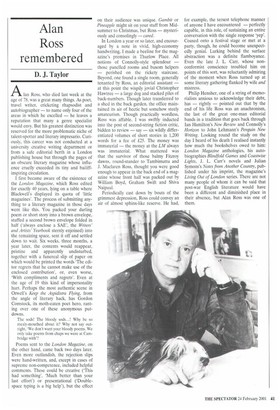Alan Ross remembered
D. J. Taylor
Alan Ross, who died last week at the age of 78, was a great many things. As poet, travel writer, cricketing rhapsodist and autobiographer — to name only four of the areas in which he excelled — he leaves a reputation that many a genre specialist would envy. But his greatest distinction was reserved for the more problematic niche of talent-spotter and literary impresario. Curiously, this career was not conducted at a university creative writing department or from a safe editorial berth in a London publishing house but through the pages of an obscure literary magazine whose influence cruelly exceeded its tiny and bailiffinspiring circulation,
I first became aware of the existence of the London Magazine. which Ross edited for exactly 40 years, lying on a table where Blackwell's displayed its quota of little magazines', The process of submitting anything to a literary magazine in those days went like this. You packed your darling poem or short story into a brown envelope, stuffed a second brown envelope folded in half (always enclose a SAE', the Writers' and Artists' Yearbook sternly enjoined) into the remaining space, sent it off and settled down to wait. Six weeks, three months, a year later, the contents would reappear, pristine and apparently undisturbed, together with a funereal slip of paper on which would be printed the words 'The editor regrets that he cannot make use of the enclosed contribution', or, even worse, With compliments and regrets'. Even at the age of 19 this kind of impersonality hurt. Perhaps the most authentic scene in Orwell's Keep the Aspidistra Flying, from the angle of literary hack, has Gordon Comstock, its moth-eaten poet hero, ranting over one of these anonymous putdowns.
The sods! The bloody sods...! Why be so mealy-mouthed about it? Why not say outright, 'We don't want your bloody poems. We only take poems from chaps we were at Cambridge with'?
Poems sent to the London Magazine, on the other hand, came back two days later. Even more outlandish, the rejection slips were hand-written, and, except in cases of supreme non-competence, included helpful comments. These could be creative (This had something', 'Much better than your last effort') or presentational (Doublespace typing is a big help'), but the effect on their audience was unique. Gambit or Pineapple might sit on your stuff from Midsummer to Christmas, but Ross — mysteriously and consolingly — cared.
In London a year or so later, and encouraged by a note in vivid, high-economy handwriting, I made a beeline for the magazine's premises in Thurlow Place. All notions of Connolly-style splendour — those panelled rooms and buxom helpers — perished on the rickety staircase. Beyond, one found a single room, generally tenanted by Ross, an editorial assistant — at this point the wispily jovial Christopher Hawtree — a large dog and stacked piles of back-numbers, Though later transferred to a shed in the back garden, the office maintained its air of hectic but somehow steely amateurism. Though practically wordless, Ross was affable. I was swiftly inducted into the post of second-string fiction critic, bidden to review — say — six wildly differentiated volumes of short stories in 1,200 words for a fee of 125. The money was immaterial — the money at the LM always was immaterial. What mattered was that the survivor of those balmy Fitzroy dawns, round-stander to Tambimuttu and J. Maclaren Ross, thought you were good enough to appear in the back end of a magazine whose front half was packed out by William Boyd, Graham Swift and Shiva Naipaul.
Periodically cast down by bouts of the grimmest depression, Ross could convey an air of almost sphinx-like reserve. He had, for example, the tersest telephone manner of anyone I have encountered — perfectly capable, in this role, of sustaining an entire conversation with the single response 'yep'. Coaxed onto a festival stage or met at a party, though, he could become unexpectedly genial. Lurking behind the surface abstraction was a definite flamboyance. Even the late J. L. Carr, whose nonconformist conscience troubled him on points of this sort, was reluctantly admiring of the moment when Ross turned up at some literary gathering flanked by wife and mistress.
Philip Hensher, one of a string of memorialists anxious to acknowledge their debt, has — rightly — pointed out that by the end of his life Ross was an anachronism, the last of the great one-man editorial bands in a tradition that goes back through Ian Hamilton's New Review and Connolly's Horizon to John Lehmann's Penguin New Writing. Looking round the study on the day I heard of his death I realised instantly how much the bookshelves owed to him: London Magazine anthologies, his autobiographies Blindfold Games and Coastwise Lights, J. L. Carr's novels and Julian Symons's Notes from Another Country, published under his imprint, the magazine's Living Out of London series. There are not many people of whom it can be said that post-war English literature would have been a different and diminished place in their absence, but Alan Ross was one of them.


































































 Previous page
Previous page